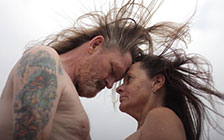|
|
|
|
Hail
|
 |
|
Are there many Australian films that really dare to do
something different, both in their content and their way of wielding the
language of cinema? Too often, even our filmmakers of creative ambition tend to
stick to – or are inexorably confined within – well-trodden grooves, genres,
formulae.
At first glance, the 2012 release crop seemed not terribly
different from this status quo. Cutesy comedies like Kath and Kimderella, PJ Hogan’s Mental, and Working Dog’s insufferable Any Questions for Ben?. Dramas that
play like high-class tele-dramas with a few showy
visual affectations thrown in, such as Kieran Darcy-Smith’s Wish You Were Here. Or braver
films that take on weighty social and historical issues – Cate Shortland’s Lore and Tony Krawitz’s Dead Europe – but do not quite have
the command over style to match their intentions.
Is it in the no-budget scene of digital filmmaking
that we should be looking for the latest surge of innovation? Certainly, a
small, personal work such as Bill Mousoulis’ Wild and Precious, shot across several
countries, has an immediacy and insight that far
better resourced directors must envy. But
the jewel of 2012 is a comet that looks like it shot in from nowhere, not even
its auteur’s previous output: Amiel Courtin-Wilson’s Hail.
There is an unsung tradition in Australian culture –
in the plays of Daniel Keene, for example, or the films of Alkinos Tsilimidos – that gazes into the lives of our
underclass battlers, but is not content to find there merely the proof of some
sociological thesis concerning widespread deprivation or alienation. Rather,
the most elemental human passions – love, loyalty, revenge, honour – are played
out, at their most elevated and tragic level, amidst the hovels and the gutters
of a desperate “low life”. There is more than a touch of grunge romanticisation
in this portrayal, but the artistic risk is, more often than not, worth taking.
Hail takes such a Dostoyevsky-like perception
to a visionary level. Daniel P. Jones and Leanne Letch – in part, playing themselves – are dogged by the usual raft of under-privilege
problems: unemployment, addiction, a criminal record, shady contacts. But their
love for each other is fierce and absolute, and Courtin-Wilson
renders this emotion in a mode that mixes the immediacy of John Cassavetes movies with the kinetic, abstract textures of the French audiovisual
artist, Philippe Grandrieux.
Plot-wise, only one major thing happens in Hail – and it happens exactly mid-way,
so I won’t give it away here. Suffice to say, Courtin-Wilson
aims to get right inside Jones’ disturbed psyche, and to convey, in richly
cinematic terms, his inner turmoil. No previous Australian feature has gone
this far into a disturbed, sensory world – beyond both mundane realism and the
comfortable, middle-class distance of social concern.
© Adrian Martin September 2012 |
![]()